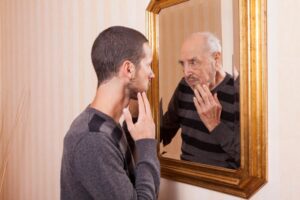
Youth is often desired for the health, vitality, and beauty that it represents. Many individuals have strict routines that promote a youthful appearance, such as regular exercise, a balanced diet, and attentive skincare. While these habits can certainly be helpful, there is another factor that plays a major role in how quickly you age: the quality of your sleep. Sleep apnea, a common sleep disorder, may cause you to age faster. How does it do so? This blog post explains.
Understanding Aging: Chronological vs. Biological Age
To appreciate the relationship between sleep apnea and aging, it is important to note the difference between chronological and biological age.
- Chronological age reflects the total number of years since your birth. This measurement advances predictably, year after year.
- Biological age, on the other hand, reveals how well your body and genes function in comparison to what is typical for your chronological age. Biological age responds to lifestyle choices, environmental factors, and underlying health conditions. For instance, you may be 50 years old by the calendar, but your body might operate like someone much younger — or older — depending on a variety of factors.
Research Findings: Sleep Apnea’s Impact on Aging
Recent research highlights the connection between sleep apnea and accelerated aging. For example, a significant study from 2019 evaluated data from more than 600 participants and discovered that sleep-disordered breathing can speed up biological aging. The severity of sleep apnea directly affected how rapidly biological age increased.
Another study, published in 2022, reinforced these findings, indicating that poor-quality sleep is linked with faster biological aging.
These results suggest that sleep apnea does not only disrupt your nights; it may also impact your longevity and increase the risk of age-related chronic conditions.
Recognizing Sleep Apnea: Key Symptoms
Obstructive sleep apnea is one of the most widespread forms of sleep-disordered breathing. Millions of people experience its effects, often without realizing the toll it takes on their health. That is why it is important that you are alert to potential signs that you have it, including the following:
- Persistent, loud snoring that interrupts your sleep or disturbs others nearby.
- Episodes where breathing stops during sleep, as noticed by a partner or family member.
- Abrupt awakenings at night, sometimes accompanied by gasping for air.
- Morning headaches or sore throat.
- Daytime fatigue and sluggishness.
- Mood changes, including irritability.
- Frequent trips to the bathroom throughout the night.
If you suspect you have sleep apnea, consult a healthcare professional to learn about your options. After receiving a diagnosis, you can start treatment. Many patients find that an oral appliance from a dentist is the most convenient way to manage their condition.
Sleep apnea can make you age faster! Be alert for signs of this disorder so you can stay youthful and strong for as long as possible.
Meet the Practice
Dr. Dhara Shah is one of three talented dentists in our Peabody, MA, practice. She has completed training in the treatment of sleep apnea and is happy to share her expertise with patients. If you have been diagnosed with this condition or need guidance on your next steps, she and our team would be happy to welcome you in for a consultation. Contact our office at 978-278-5478.
